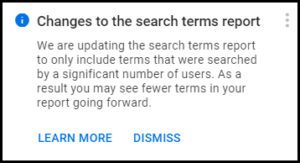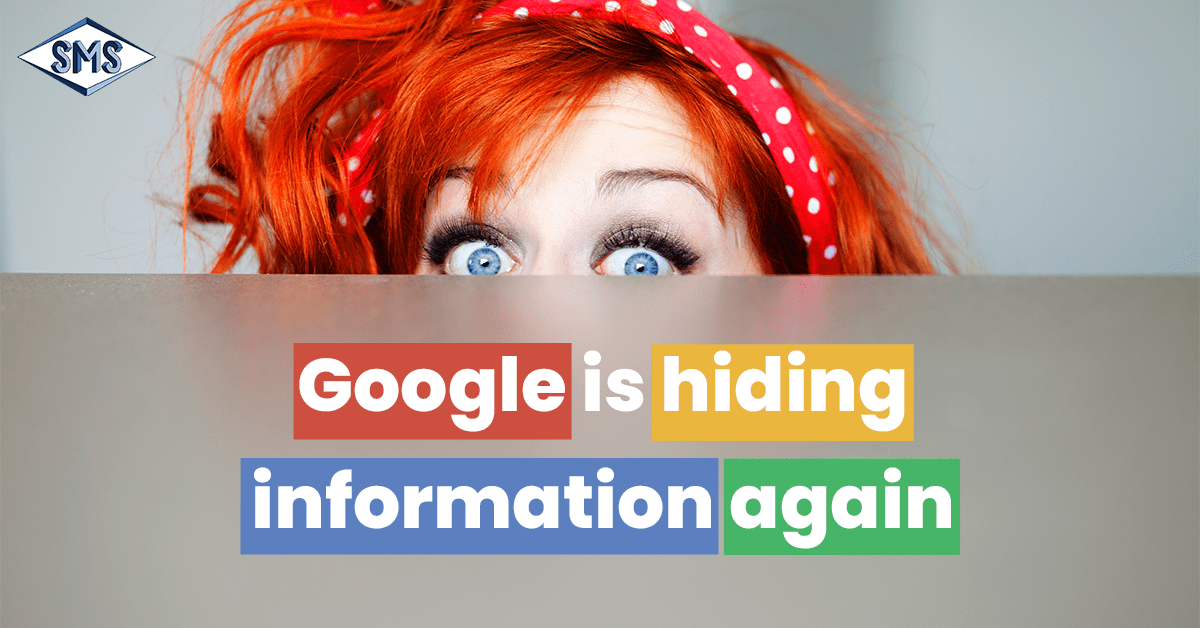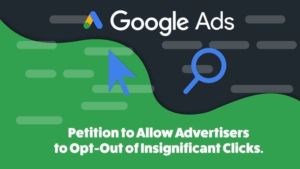 Did you catch the notice in your Google Ads account like the one to the left? Well, our friends over at Search Engine Land sure did and posted an article about vanishing Search Query Data. This created lively discussion in our Virtual Office. There is little doubt that Google is going to make this worse than it already is. Google has been hiding search query data for many years and it looks like they are going to make this even worse. Not every advertiser realizes this but there is a huge difference between the clicks you paid for and the search query total reported. With Google’s first year over year decline in revenue, maybe it is time for advertisers to come together and bring balance back to this relationship.
Did you catch the notice in your Google Ads account like the one to the left? Well, our friends over at Search Engine Land sure did and posted an article about vanishing Search Query Data. This created lively discussion in our Virtual Office. There is little doubt that Google is going to make this worse than it already is. Google has been hiding search query data for many years and it looks like they are going to make this even worse. Not every advertiser realizes this but there is a huge difference between the clicks you paid for and the search query total reported. With Google’s first year over year decline in revenue, maybe it is time for advertisers to come together and bring balance back to this relationship.
Search Query Data has not accounted for the full advertising spend for as long as I can remember and I started in Google Ads (then called Google AdWords) on July 7, 2003. In this latest release, the claim is that this is to protect privacy. To this claim, we have to call BS and would like to know exactly how that works. Google has steadily stripped away control and detail in matching and reporting and at some point, advertisers need to push back just to bring a fair balance in the relationship.
In the olden days, Google Analytics gave us organic search data but that was stopped in the name of privacy, then moved over to Google Search Console, where the data is, let’s say, a little suspect. After 17 years of looking at Search Queries, I can tell you that whatever is in the Google Search Console, they are not search queries. I imagine this is rolled up data based on what Google thinks should be reported. Recently we have noticed that the percent of reported traffic in search queries within Google Ads has fallen from 20% to 10%. This makes the information close to worthless. Google is executing a strategy of taking data and control away from people and moving it to Machine Learning where they can make sure that they always win.
Google is a Monopoly – So what?
A monopoly is not, by itself, a bad thing. However, a monopoly is power and absolute power corrupts absolutely. Google earned their monopoly and they are entitled to reap the rewards of that. However, they need to act fairly and not use that power for evil. Google policy is largely fair but not always. When it is not fair, there is no trusted neutral third party to arbitrate the situation. We have watched Google go from private to public and the policy slant more toward what is good for Google rather than what is fair for advertisers.
Advertisers Unite
Relationships only work if they are balanced and that requires equalized power. The only way that is going to happen is if Advertisers band together. No single advertiser can stand up to Google and Google continues to make decisions on this fact. In 2012, Google made a change to the ad rotation causing an uprising, proving they will back down when the pressure is high enough. The challenge is that they do this in little pieces to avoid getting unwanted attention. If Advertisers were united, they could be part of the decision making process making the result closer to fair. Advertisers have the right to demand that the money they invest can be clearly tracked and understood.
Advertisers Should Have Options
In a fair relationship, when Google wants to implement a change, that should be fine but advertisers should have the right to opt-out. Google decides that measuring position is better with percent of placement rather than average position. This is most likely data they need for their Machine Learning algorithm but maybe our accounts are managed better with average position. What Google wants to change in their system is fine, the one thing we want is the option to choose which approach is best for our clients. Here is a particle list of items that Google has taken away that should be advertisers options:
- Accelerated Delivery
- Keyword Matching Control (Close variants versus strict matching rules)
- Average Position
- Placement Controls
- Search Query Data
- Ad Rotation (gave this back but it is not a strict rule application)
- Location Control (People in or regularly in your targeted locations versus people in your targeted location)
- Daily Budget Control (get rid of catch up rules)
I am sure with a little research this list could be much longer. Just because Google likes it does not mean it’s good for advertisers. Google continues to push changes and “features” that are good for them but necessarily you. Advertisers must have an active role in data policy.



